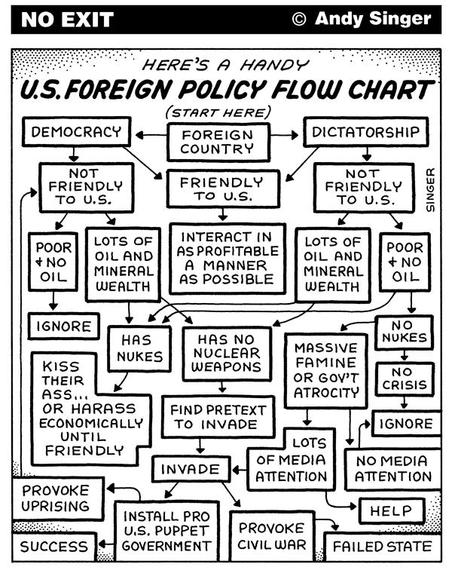A critique of the annual Failed (Fragile) State Index by Fund for Peace
"There is no steady unretracing progress in this life; we do not advance through fixed gradations, and at the last one pause..." - Herman Melville, Moby Dick
The annual Failed (Fragile) States Index, includes over 100 sub-indicators of state failure grouped into twelve primary social, economic and political indicators. The "top 10" states on the Failed State Index this year, includes everyone from Congo to Pakistan. It is "frustratingly imprecise," despite the farce of empirical data used to curate this list.
"Failed states" is a deeply flawed analytical category. The concept has always had a definition problem, wandering between imprecise and all encompassing. More specifically it employs sweeping aggregations of diverse states and their problems.
Professor Charles Call describes the Index as a "linear scorecard defined by Weberian endstate," that encompasses "states as diverse as Colombia, East Timor, Indonesia, North Korea, Cote d'Ivoire, Haiti, Iraq, and the Sudan." Countries whose social symptoms that "range from poverty to civil war to ethnic diversity to displacement."
"Quasi-states," "weak states," "failed states," "fragile state" and "rogue states" -- what such labels have in common, is that they are all portrayals of post-colonial states. Depictions that enable enforcement of certain policies which serve the economic, political and security interests of those who employ them. It is also a reflection of consistent poverty of understanding of post-colonial statehood.
The Index fashions itself as an apolitical, solution driven enterprise. It proposes a paradigm to save failed state or assists these disintegrating states with a set of generic solution to a diverse set of problems. While failing to avert or alleviate conditions in these counties, the concept of the failed state has sustained the rationale for intervention and imposing western interests, both neo-liberal and neo-colonial, on less powerful nations.
The term "failed states" became a mainstay of contemporary American policy discourse with the publication of Gerald Helman and Steven Ratner's, 'Failed States' article in Foreign Policy in 1993. They referred to "failed states" as being "simply unable to function as independent entities" and in "a situation where governmental structures are overwhelmed by circumstances." The article discussed Haiti, Yugoslavia, the USSR, Sudan, Liberia and Cambodia, without quite referring to the history of external intervention in these countries.
The following year, CIA funded "The State Failure Task Force," a research project based at the University of Maryland. The Task force was meant to identify the underlying causes of state failure, that took place in the '90s in Somalia, Bosnia, Liberia, Afghanistan, and the Democratic Republic of Congo.
Throughout the '90s, research proliferated around matters of governance, empirical measures that could evaluate state capacity and democratization. In the wake of September 11, the attention turned to establishing nebulous relationships between "failed states," lawlessness and terrorism, becoming the rallying call to fight the Global War on Terror. The US National Security Strategy of 2002 echoed this sentiment and proclaimed that: "America is now threatened less by conquering states than by failing ones." Foundations and think-tanks rushed to fund work on failing states, resulting in a proliferation and production of knowledge that supported this thesis. One of the most egregious and fatal conclusions reached by these scholars and think tank pundits was placing descriptive characteristics of states above the factors causing them.
Conditions of "failed states" and the calls for increased intervention in these countries as a means of coping with international terrorism is a norm now. Conversations about the ongoing Syrian, Iraqi and Libyan crisis continue to be laced with this interventionist opiate.
American historian Bernard de Voto once stated that History abhors determinism but cannot tolerate chance. The Failed state Index thrives on a certain determinism, abhors the gravity of history. This discourse on "failed" or "fragile" states focuses on the domestic behavior of states, and the security implications of such behavior for the liberal international order, without inquiring into the historical, political and economic conjunctures that result in such behavior. It fails to account for long-term historical structures, and privileges recent events.
Somalia was regularly invoked during the '90s to bolster the failed State thesis. The country witnessed total disappearance of central authority, which prevailed over a protracted period from 1991 until roughly 2004. This is the only case of such utter disintegration of a state in this century.
Somalia's complete disintegration however, was an exception not comparable to other countries in the Index and cannot be explained within the paradigm of Failed states. The framework fails to account the problematic colonial legacy; imposed alien state institutions; Somalia's as a Cold War proxy, which led to unconditional support from the West for a corrupt and brutal regime; IMF structural adjustment and its disastrous impact on the countries economy; and the arms markets around the Gulf of Aden which developed as a byproduct of the Cold War. All contributing to Somalia's descent into anarchy.
The analysis of who has failed and who has not, why and where failure has occurred, refuses "to look honestly in the mirror." In Failed States: The Abuse of Power and the Assault on Democracy, Noam Chomsky states that, "If we allow ourselves to do so, we should have little difficulty in finding the characteristics of failed states right at home."
Indexes and models of failure based on indicators rather than teleology cannot read the course of human political history. And scores cards are not predictive or diagnostic models, laden with solutions. There are inevitable rises and falls, in the process of state formation. Cities collapse, a country splits at it seams to form more States, State capacity expands and shrinks, new states continue to proliferate and polities everywhere experience periods of stability and agitations.
We must begin recognizing that these Indexes can do nothing for our understanding of process and causation until we examine more legitimate modes of inquiry that look at specific local and historical process that divorces itself from the framework of lawlessness -- instability -- terrorism.
It is time to retire this rhetoric.


